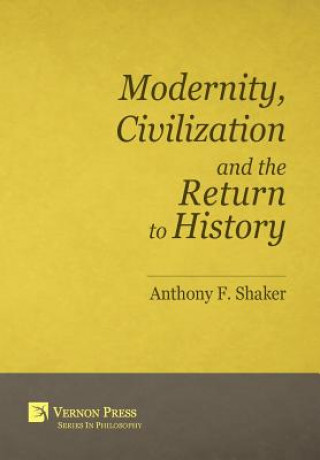
Kod: 15815119
Modernity, Civilization and the Return to History
Autor Anthony F. Shaker
The modern concept and study of civilization have their roots, not in western Europe, but in the spirit of scientific investigation associated with a self-conscious Islamicate civilization. What we call modernity cannot be fathome ... więcej
- Język:
 Angielski
Angielski - Oprawa: Twarda
- Liczba stron: 586
Wydawca: Vernon Press, 2017
- Więcej informacji o książce

Zobacz książki o podobnej tematyce
-

Dune
49.84 zł -3 % -

Haunting Adeline
84.06 zł -33 % -

Berserk Deluxe Volume 2
210.61 zł -1 % -

White Nights
10.83 zł -28 % -

Powerless
46.45 zł -14 % -

Atomic Habits
54.61 zł -31 % -

Dune Messiah
45.76 zł -3 % -

Berserk Deluxe Volume 3
215.69 zł -3 % -

One Day
33.92 zł -44 % -

Berserk Deluxe Volume 1
214.29 zł -4 % -

Iron Flame
60.38 zł -28 % -

Surrounded by Idiots
36.30 zł -28 % -

Harry Potter and the Prisoner of Azkaban (Minalima Edition)
168.33 zł -2 % -

Gravity Falls Journal 3
88.14 zł -

Heaven Official's Blessing: Tian Guan Ci Fu (Novel) Vol. 1
86.15 zł -3 % -

The Creative Act
101.67 zł -12 % -

Dune
47.65 zł -21 % -

Hunting Adeline
124.75 zł -4 % -

A Little Life
48.34 zł -11 % -

Children of Dune
46.15 zł -2 % -

Heaven Official's Blessing: Tian Guan Ci Fu (Novel) Vol. 2
76.80 zł -14 %
Bon podarunkowy: Radość gwarantowana
- Podaruj bon o dowolnej wartości, a my się zajmiemy resztą.
- Bon podarunkowy dotyczy całej naszej oferty.
- Możesz wydrukować elektroniczny bon z e-maila a następnie przekazać go obdarowanemu.
- Ważność bonu wynosi 12 miesięcy od daty wystawienia.
Więcej informacji o Modernity, Civilization and the Return to History
Za ten zakup dostaniesz 267 punkty
 Opis
Opis
The modern concept and study of civilization have their roots, not in western Europe, but in the spirit of scientific investigation associated with a self-conscious Islamicate civilization. What we call modernity cannot be fathomed without this historical connection. We owe every major branch of science known today to the broad tradition of systematic inquiry that belongs to a "region of being"-as Heidegger would say-whose theoretical, practical and institutional dimensions the philosophy of that civilization played an unprecedented role in creating. This book focuses primarily on the philosophical underpinnings of questions relating to civilization, personhood and identity. Contemporary society and thinking in western Europe introduced new elements to these questions that have altered how collective and personal identities are conceived and experienced. In the age of "globalization," expressions of identity (individual, social and cultural) survive precariously outside their former boundaries, just when humanity faces perhaps its greatest challenges-environmental degradation, policy inertia, interstate bellicosity, and a growing culture of tribalism. Yet, the world has been globalized for at least a millennium, a fact dimmed by the threadbare but still widespread belief that modernity is a product of something called the West. One is thus justified in asking, as many people do today, if humanity has not lost its initiative. This is more a philosophical than an empirical question. There can be no initiative without the human agency that flows from identity and personhood-i.e., the way we, the acting subject, live and deliberate about our affairs. Given the heavy scrutiny under which the modern concept of identity has come, Dr. Shaker has dug deeper, bringing to bear a wealth of original sources from both German thought and żikmah (Islamicate philosophy), the latter based on material previously unavailable to scholars. Posing the age-old question of identity anew in the light of these two traditions, whose special historical roles are assured, may help clear the confusion surrounding modernity and, hopefully, our place in human civilization. Proximity to Scholasticism, and therefore Islamicate philosophy, lent German thought up to Heidegger a unique ability to dialogue with other thought traditions. Two fecund elements common to Heidegger, Qunawi and Mulla żadra are of special importance: Logos (utterance, speech) as the structural embodiment at once of the primary meaning (essential reality) of a thing and of divine manifestation; and the idea of unity-in-difference, which żadra finally formulated as the substantial movement of existence. But behind this complexity is the abiding question of who Man is, which cannot be answered by theory alone. Heidegger, who occupies a good portion of this study, questioned the modern ontology at a time of social collapse and deep spiritual crisis not unlike ours. Yet, that period also saw the greatest breakthroughs in modern physics and social science. The concluding chapters take up, more specifically, identity renewal in Western literature and Muslim "reformism." The renewal theme reflects a point of convergence between the Eurocentric worldview, in which modernism has its secular aesthetics roots, and a current originating in Ibn Taymiyyah's reductionist epistemology and skeptical fundamentalism. It expresses a hopeless longing for origin in a historically pristine "golden age," an obvious deformation of philosophy's millennial concern with the commanding, creative oneness of the Being of beings.
 Szczegóły książki
Szczegóły książki
Kategoria Książki po angielsku Humanities Philosophy History of Western philosophy
453.17 zł
- Pełny tytuł: Modernity, Civilization and the Return to History
- Autor: Anthony F. Shaker
- Język:
 Angielski
Angielski - Oprawa: Twarda
- Liczba stron: 586
- EAN: 9781622731848
- ISBN: 1622731840
- ID: 15815119
- Wydawca: Vernon Press
- Waga: 933 g
- Wymiary: 229 × 152 × 35 mm
- Data wydania: 26. January 2017
zadowolonych klientów
Od roku 2008 obsłużyliśmy wielu miłośników książek, ale dla nas każdy był tym wyjątkowym.
Copyright! ©2008-24 libristo.pl Wszelkie prawa zastrzeżonePrywatnieCookies



 21 milionów książek
21 milionów książek Dostawa 10.99 zł
Dostawa 10.99 zł (32) 444 93 66 (8-15.30h)
(32) 444 93 66 (8-15.30h)